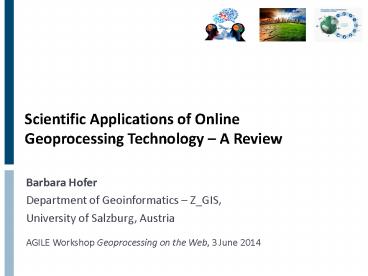Scientific Applications of Online Geoprocessing Technology - PowerPoint PPT Presentation
Title:
Scientific Applications of Online Geoprocessing Technology
Description:
Scientific Applications of Online Geoprocessing Technology A Review Barbara Hofer Department of Geoinformatics Z_GIS, University of Salzburg, Austria – PowerPoint PPT presentation
Number of Views:130
Avg rating:3.0/5.0
Title: Scientific Applications of Online Geoprocessing Technology
1
Scientific Applications of Online
Geoprocessing Technology A Review
- Barbara Hofer
- Department of Geoinformatics Z_GIS,
- University of Salzburg, Austria
- AGILE Workshop Geoprocessing on the Web, 3 June
2014
2
Outline
- Motivation Reach of online geoprocessing
technology - Methodology Systematic analysis of publications
- Results Few applications in scientific
context - Issues Community building, usability issues
- Future work Error prevention to increase
usability
3
Advantages of Online Geoprocessing
4
Motivation of a Review Technology as Keyword
- The use of GIS for monitoring and predicting
urban growth in East and West St Paul, Winnipeg,
Manitoba, Canada (Hathout 2002) - Use of GIS for estimating potential and actual
forest biomass for continental South and
Southeast Asia (Iverson et al. 1994) - Use of GIS-based models for integrating and
developing marine fish cages within the tourism
industry in Tenerife (Canary Islands) (Perez et
al. 2003) - Modeling urban dynamics through GIS-based
cellular automata (Batty et al. 1999)
5
Bibliometric Analysis
- Questions
- How many applications of online geoprocessing
technology in research contexts exist? - Which types of applications can be
differentiated? - Approach
- Bibliometric analysis using Scopus (Elsevier)
6
Bibliometric Analysis cont.
Keyword set GIS
geospatial
geoinformation
geographic information
geodata
spatial data
geographic information system
geographical information system
GIS
geoprocessing
geocomputation
spatial analysis
spatial data infrastructure
Keyword set online geoprocessing
e-Science
cyberinfrastructure
geoprocessing web
geospatial web
model web
web-based
Internet-based
web service
service oriented architecture
web processing service
web feature service
web map service
web coverage service
sensor observation service
7
Applications of Online Geoprocessing
- Identification of application type
- Direct reference to online geoprocessing
- Assessment of scope of article
8
Categorization of Applications
Service platforms
Theme-specific platforms
General purpose processing tools
Stand-alone functionality
Data provision services
Specific processing functionality
Models as services
9
Results
10
Results (cont.)
- One example for a theme specific platform
- Dominkovics et al. (2011) support the analysis of
tuberculosis cases in Barcelona, Spain with
density maps that are produced with web-based
geospatial services. - Some observations
- Thematic bundling of operations seems useful
- SOA as technological principle
- Not necessarily sharing of services taking place
- Further adaptation of tools reported in the
articles
11
Results (cont.)
- Example for the use of general purpose
functionality - Shook et al. (2012) create emotional heatmaps for
the topics armed conflict based on Wikipedia
entries. - Data intensive visual analytics
- Interpolation of data to heatmaps
- The platform used is the CyberGIS platform (Wang
2010) - Research required the use of a cyberinfrastructure
12
User Perspective
- As with any deployment of information
technology, it cannot be assumed that just
because tools are provided they will be used
(Poore 2011, p.5510). - the problems of learning and membership in a
community that are critical to infrastructure
development remain (Poore 2011, p.5514).
13
Usability Studies Views of Poore (2011)
- Usability studies must consider
- Work practices
- Articulations of users
- Tacit knowledge
- GIScience approaches need to be extended
- More than map interface studies required
- Usability of all the system
14
Proposed Work Error Prevention
- Stasch et al. 2014 Meaningful Spatial Prediction
and Aggregation - Formalization of operations
- Extension of process profiles
15
Summary
- Literature-based analysis of applications of
online geoprocessing - Limited number of applications documented
- Differentiation of application types
- Request for usability considerations
- Error prevention through feedback
16
Thank you for your attention!
- Barbara Hofer
- barbara.hofer_at_sbg.ac.at
- Department of Geoinformatics Z_GIS, University
of Salzburg, Austria - AGILE Workshop Geoprocessing on the Web, 3 June
2014
17
References
- Dominkovics, P., C. Granell, A. Pérez-Navarro, M.
Casals, Á. Orcau and J.A. Caylà 2011. Development
of spatial density maps based on geoprocessing
web services Application to tuberculosis
incidence in barcelona, spain. International
Journal of Health Geographics 10. - B. S. Poore, "Users as essential contributors to
spatial cyberinfrastructures," Proceedings of the
National Academy of Sciences of the United States
of America, vol. 108, pp. 5510-5515, 2011. - Shook, E., K. Leetaru, G. Cao, A. Padmanabhan and
S. Wang. 2012. Happy or not Generating
topic-based emotional heatmaps for culturomics
using cybergis. - Stasch, C., S. Scheider, E. Pebesma, W. Kuhn,
2014. Meaningful Spatial Prediction and
Aggregation. Environmental Modelling Software,
51, (149165, open access). - Wang, S. 2010. A cybergis framework for the
synthesis of cyberinfrastructure, gis, and
spatial analysis. Annals of the Association of
American Geographers 100, no. 3 535-57.































